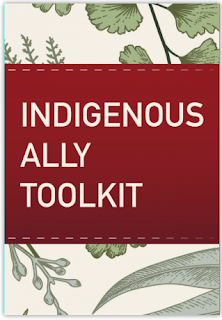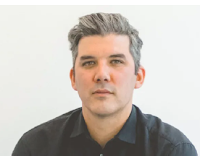Thursday, March 28, 2019
[Indigenous ally toolkit]
"What does it mean to be a good ally to Indigenous Peoples?
It's something the Montreal Urban Aboriginal Community Strategy Network is hoping to clarify with its recently launched Indigenous ally toolkit.
The toolkit provides an overview on terminology, dos and don'ts, with examples of why the term "Canada's Indigenous Peoples," asking "why don't you just get over it?" or saying "you must be an alcoholic" is problematic."
The toolkit is available from the Montreal Urban Aboriginal Community Strategy NETWORK Resources page.
Read the CBC article about this toolkit.
categories:
indigenous
Thursday, February 28, 2019
treaty acknowledgements and redwashing
Hayden King, an Anishinaabe writer and educator who works at Ryerson University, was involved in the writing of that university's territorial acknowledgement. He now regrets what he wrote, and says:
I'd like to move towards a territorial acknowledgement where you provide people with a sort of framework and then let them write it themselves. The really important aspect of a territorial acknowledgement for me, anyway, is this sort of obligation that comes on the back end of it.
It's one thing to say, "Hey, we're on the territory of the Mississaugas or the Anishinaabek and the Haudenosaunee." It's another thing to say, "We're on the territory of the Anishinaabek and the Haudenosaunee and here's what that compels me to do."
…
[Treaty acknowledgement] effectively excuses them and offers them an alibi for doing the hard work of learning about their neighbours and learning about the treaties of the territory and learning about those nations that should have jurisdiction.
(Source: Hayden King as quoted in https://www.cbc.ca/radio/unreserved/i-regret-it-hayden-king-on-writing-ryerson-university-s-territorial-acknowledgement-1.4973371)
categories:
exclusion,
indigenous
Wednesday, February 06, 2019
employee resource groups for the flourishing of employees
As diversity and inclusion initiatives increase, Employee Resource Groups (ERGs) are becoming more common. In fact, your workplace might have some.
"Employee Resource Groups for the Flourishing of Employees" is a resource that I've been working on over the past year, and which I hope will be of use to some of you.
It introduces ERGs, presents seven key principles, discusses their evolution over time and includes steps for starting a new Employee Resource Group, with a particular focus on their purpose being the flourishing of employees.
What's unique about this resource? At least two things:
- The focus on the flourishing of employees. For the record, the flourishing of employees is not always the reason that ERGs are started. Particularly in the for-profit sector, corporations use ERGs as a way of increasing innovation, attracting new employees, connecting with potential markets, etc. Few in the world of ERGs are emphasizing the flourishing of employees.
- The seven key principles. There are many resources available online yet I have not seen any that have anything close to these key principles. These principles help ensure that ERGs increase diversity and inclusion overall and focus on the flourishing of employees without becoming introverted.
Access the PDF here and comment below.
Tuesday, January 29, 2019
minority and minoritized
Minotaur with tie
in the minority but
not minoritized
I came across a fascinating article discussing the terms minority and minoritized.
I'll introduce the idea this way: It suggests that we change our usage of terms so that minority has to do with numbers (namely, the opposite of majority, or less than half) and minoritized has to do with how people treat other people -- specifically, treating them as if they are less than.
For example, in university, less than half the students wear glasses, so they are in the minority. While the occasional post-secondary student with glasses might be made fun of, overall, they are not treated badly or oppressed because of wearing glasses. Thus, though in the minority, they are not minoritized.
Or to give a more pertinent example, white slave owners and their families were in the minority on the plantations, but it was the slaves who were minoritized. The slave owners had the power and control; the slaves were oppressed and without power.
Here are new definitions proposed by I.E. Smith:
Definition: Minority
1: a group of less than half of the total, a group that is sufficiently smaller in number
2: of or relating to quantities that are comparatively less
3: a relatively small group
Definition: Minoritized
1: groups that are different in race, religious creed, nation of origin, sexuality, and gender and as a result of social constructs have less power or representation compared to other members or groups in society
2. To be a person forced into a group that is mistreated or faces prejudices such as albeism, racism, homophobia, and islamaphobia
3. To be in a small group of people that is discriminated against because of situations outside of personal control
Read the whole article at: https://www.theodysseyonline.com/minority-vs-minoritize
A similar term that I've come across recently is "invisibilized" in contrast to "invisible". It suggests that some groups of people are made invisible...
Tuesday, January 08, 2019
(in)authentic ethic of inclusion
This cartoon was inspired by Yvette Flunder in Where the Edge Gathers: Building a Community of Radical Inclusion:
An authentic ethic of inclusion must reach from the center to the farthest margin and work its way back. When we reach for the ones who are the least accepted, we give a clear message of welcome to everyone. Jesus modeled this type of radical inclusivity when he openly received those most despised by society and the religious establishment.
Where the Edge Gathers, pp 25-26
Read more about this, and see another original cartoon:
https://exclusionandembrace.blogspot.com/2015/10/an-authentic-ethic-of-inclusion.html
categories:
embrace,
exclusion,
quotes from flunder
Wednesday, December 19, 2018
apology to two-spirit peoples
I saw these on a poster board on Jasper Avenue in downtown Edmonton the other day. Don't know who in particular put them up but they have an important message.
As a Christian I would like to apologize to two-spirit women and men, and to the broader Indigenous communities, for the pervasive and long-term oppression and attempted destruction of who you are, particularly by Christians. This is not the way of Jesus and I am deeply sorry and grieved.
I cannot undo the past but I commit to listening to your stories, acknowledging wrongdoing, increasing awareness in the circles I move in, opening spaces for you to speak and teach us, and working together for a better today and tomorrow.
 If you are two-spirit or transgender, you are a gift from the Creator. You are beautiful and the world is incomplete without you.
If you are two-spirit or transgender, you are a gift from the Creator. You are beautiful and the world is incomplete without you.Want to learn more about two-spirit and what that means?
This video is a great introduction.
categories:
embrace,
indigenous,
lgbtq,
two spirit
Friday, November 30, 2018
MacEwan University and Indigenous Peoples
In the past few months I have become increasingly impressed with MacEwan University's commitment to Indigenous peoples and reconciliation. While not a student or staff there myself, I live in Edmonton and have been at their campus for several events.
Here are some of the reasons:
At the start of an event I attended there, Fred McGinn, Dean of Health and Community Studies, in his opening remarks said that MacEwan has the goal of being the first university in Canada to meet the Truth and Reconciliation Commission's Calls to Action (presumably, those that apply to educational institutions). That's quite a goal!
In 2019, it will be moving to a larger more prominent location in the Robbins Health Centre building.
Roxanne Tootoosis is the university's Indigenous knowledge keeper and facilitator. Read more about her.
categories:
embrace,
indigenous,
reconciliation
Monday, October 29, 2018
[positive space at norquest college]
I saw this sign in an office at NorQuest College in Edmonton. Was intrigued by the design which includes the trans colours in the arrow shape as well as brown and black to be inclusive of different races.
Text reads: "This is a place where human rights are respected and where lesbian, gay, bisexual, trans, two spirit, intersex, asexual, non-binary, queer and questioning people are welcomed and supported."
Subscribe to:
Posts (Atom)







